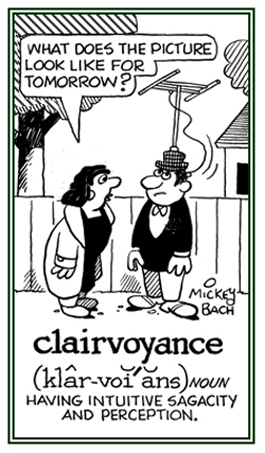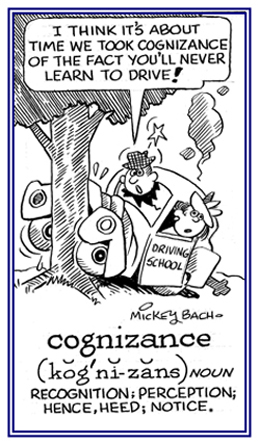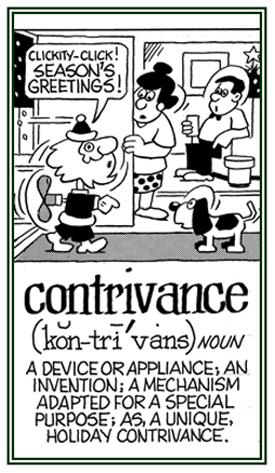-ance, -ancy
(Latin: often through French, quality or state of; being; condition; act or fact of _______ ing; a suffix that forms nouns)
1. The specific impediment of cells to the action of chemicals: Chemoresistance involves the aversion to or insusceptibility of the basic functional unit of an organism to a particular therapeutic drug.
2. The immunity exhibited by certain tumors and tissues from destruction by chemotherapeutic drugs: After taking the medication gemcitabine to treat the solid tumor for a number of years, Mrs. Tennison's doctor observed that the tumor had developed a chemoresistance to it.
2. The immunity exhibited by certain tumors and tissues from destruction by chemotherapeutic drugs: After taking the medication gemcitabine to treat the solid tumor for a number of years, Mrs. Tennison's doctor observed that the tumor had developed a chemoresistance to it.
cinedance
1. A condition or fact attending an event and having some bearing on it; a determining or modifying factor: Before the hiking trip in the mountains could begin, the weather factor was a circumstance of utmost importance!
2. A condition or fact that determines or must be considered in working out a course of action: Many people think that abortion should be allowed under certain circumstances.
3. The sum of determining factors beyond willful control: Jim couldn't do his homework due to the circumstance that there was a power failure during the night and he couldn't see well enough to do it.
4. A detail accompanying or surrounding an event; such as, in a narrative or series of events: In order to make his decision, Thomas had to consider each circumstance in turn in order not to make a mistake.
5. A formal display or ceremony: Very often the pomp and circumstance of a coronation is always shown on television.
6. A particular incident or occurrence: The circumstance of Jeffrey and Marjory getting married without inviting any guests really surprised their friends.
2. A condition or fact that determines or must be considered in working out a course of action: Many people think that abortion should be allowed under certain circumstances.
3. The sum of determining factors beyond willful control: Jim couldn't do his homework due to the circumstance that there was a power failure during the night and he couldn't see well enough to do it.
4. A detail accompanying or surrounding an event; such as, in a narrative or series of events: In order to make his decision, Thomas had to consider each circumstance in turn in order not to make a mistake.
5. A formal display or ceremony: Very often the pomp and circumstance of a coronation is always shown on television.
6. A particular incident or occurrence: The circumstance of Jeffrey and Marjory getting married without inviting any guests really surprised their friends.
1. The supposed ability to view, or to look at, something that is normally over and above the possibilities of human awareness: Joseph claimed to have clairvoyance which consisted of acute perceptions and intuitive insights for people in their present existence and for the future.
2. Etymology: from French clairvoyant, "clear-sighted"; from voyant, present participle of voir, "see".

© ALL rights are reserved.
Go to this Word A Day Revisited Index
2. Etymology: from French clairvoyant, "clear-sighted"; from voyant, present participle of voir, "see".

Go to this Word A Day Revisited Index
so you can see more of Mickey Bach's cartoons.
clearance
1. Conscious knowledge or awareness: The cognizance of the importance of the issue at hand was realized by the board of directors.
2. The range of what one can know or understand: Harriet's cognizance and perception of the nature of the species of the bird was quite amazing!
3. Observance; notice: The administrator will take cognizance of Jill's objections at the proper time.
4. In law, acknowledgment, recognition, or jurisdiction; the assumption of jurisdiction in a case: The court, being within cognizance, was able to act upon the case of murder without needing any further proof.
5. In heraldry, a crest or badge worn to distinguish the bearer: The knight was honored with a cognizance because of his bravery in battle.
6. Etymology: from Anglo-French conysance, "recognition"; later, "knowledge" from Old French conoissance, "acquaintance, recognition; knowledge, wisdom" (Modern French connaissance), from conoistre, "to know"; from Latin cognoscere, "to get to know, to recognize"; from com-, "together" + gnoscere, "to know".

© ALL rights are reserved.
Go to this Word A Day Revisited Index
2. The range of what one can know or understand: Harriet's cognizance and perception of the nature of the species of the bird was quite amazing!
3. Observance; notice: The administrator will take cognizance of Jill's objections at the proper time.
4. In law, acknowledgment, recognition, or jurisdiction; the assumption of jurisdiction in a case: The court, being within cognizance, was able to act upon the case of murder without needing any further proof.
5. In heraldry, a crest or badge worn to distinguish the bearer: The knight was honored with a cognizance because of his bravery in battle.
6. Etymology: from Anglo-French conysance, "recognition"; later, "knowledge" from Old French conoissance, "acquaintance, recognition; knowledge, wisdom" (Modern French connaissance), from conoistre, "to know"; from Latin cognoscere, "to get to know, to recognize"; from com-, "together" + gnoscere, "to know".

Go to this Word A Day Revisited Index
so you can see more of Mickey Bach's cartoons.
complaisance (s) (noun)
1. An inclination or a tendency to willingly give in to the requests of others.
2. A disposition to please or to comply willingly and in a friendly way with the wishes of another person or other people.
2. A disposition to please or to comply willingly and in a friendly way with the wishes of another person or other people.
1. Behaving according to certain accepted standards: "Ralph felt that compliance with school rules was not always convenient for him to follow until he was suspended for being tardy too often.'
2. A tendency to conform with or to agree with the wishes of others: "Elva and Sue found out that their compliances with the company's rules were appreciated and the standards were beneficial for everyone."
2. A tendency to conform with or to agree with the wishes of others: "Elva and Sue found out that their compliances with the company's rules were appreciated and the standards were beneficial for everyone."
concordance
1. A secret joint conspiracy or plotting to do something; usually, wrong or illegal: "He was involved in the connivance of his brother's shoplifting with the understanding that he would share the things that were stolen."
2. Tacit encouragement (expressed without being said directly) or an agreement to doing some kind of wrongdoing; unspoken encouragement of or consent (without participation) to wrongdoing by someone else.
3. Pretended ignorance or a secret encouragement of wrongdoing.
2. Tacit encouragement (expressed without being said directly) or an agreement to doing some kind of wrongdoing; unspoken encouragement of or consent (without participation) to wrongdoing by someone else.
3. Pretended ignorance or a secret encouragement of wrongdoing.
1. An agreement with something or someone: The candidate's beliefs are in consonance with his political party's objectives and proposals.
2. Consisting of harmonious sounds which are pleasing to hear: Laura and Jim enjoyed the concert which was full of wonderful consonances from the beginning to the end.
3. The various letters that make pronunciations; usually, at the endings of words: A few examples of consonances include the letters "st" as in the words "first, last, forest, host, slowest, fast, most", etc.
2. Consisting of harmonious sounds which are pleasing to hear: Laura and Jim enjoyed the concert which was full of wonderful consonances from the beginning to the end.
3. The various letters that make pronunciations; usually, at the endings of words: A few examples of consonances include the letters "st" as in the words "first, last, forest, host, slowest, fast, most", etc.
1. The condition of being stable; steadfastness in affection: The constancy in their marriage is what Kitty treasured so much after being married for 40 years.
2. A consistent quality or trait of an individual or thing: The weather in Los Angeles, for example, shows constancy in that the sun shines and is very warm or hot for about 9 months of the year!
2. A consistent quality or trait of an individual or thing: The weather in Los Angeles, for example, shows constancy in that the sun shines and is very warm or hot for about 9 months of the year!
continuance
continuancy
1. A cleverly made device or machine or contraption to fulfill a special need: Jim’s dad created a contrivance to heat the inside of the sleeping bag while camping during the cold night by using a hot rock that had been put in the campfire and then taken out and wrapped up with newspapers.
2. Something or an idea created in a clever way to accomplish an objective: The manager of the store thought up a contrivance to encourage customers to buy the store's tea products, like serving hot tea to the customers on cold winter days.
3. Etymology: from Middle English contreven, from Old French controver, contreuv-, from Medieval Latin contropare, "to compare"; from Latin con-, "together, with" + Latin tropus, "turn, manner, style"; from Greek tropos, "turn, manner, mode, style".

© ALL rights are reserved.
Go to this Word A Day Revisited Index
2. Something or an idea created in a clever way to accomplish an objective: The manager of the store thought up a contrivance to encourage customers to buy the store's tea products, like serving hot tea to the customers on cold winter days.
3. Etymology: from Middle English contreven, from Old French controver, contreuv-, from Medieval Latin contropare, "to compare"; from Latin con-, "together, with" + Latin tropus, "turn, manner, style"; from Greek tropos, "turn, manner, mode, style".



